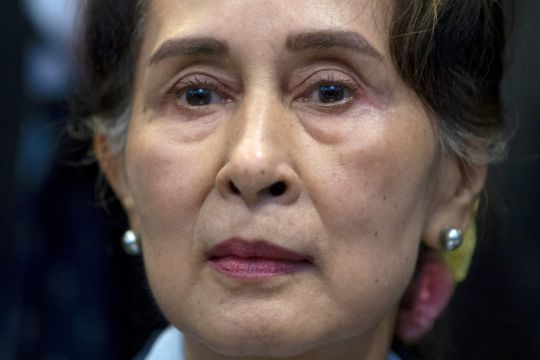Myanmar’s ousted leader Aung San Suu Kyi has gone on trial on charges that many observers say are an attempt by the junta that deposed her to eliminate her as a political force and cement the military’s power.
Ms Suu Kyi’s prosecution poses yet another major setback for Myanmar, which had been making slow progress towards democracy when a February coup prevented elected MPs from her National League for Democracy party from taking office following last year’s landslide victory.
Human Rights Watch said that the allegations being heard in a special court in the capital, Naypyitaw, are “bogus and politically motivated” with the intention of nullifying the victory and preventing Ms Suu Kyi from running for office again.
“This trial is clearly the opening salvo in an overall strategy to neuter Suu Kyi and the National League for Democracy party as a force that can challenge military rule in the future,” said Phil Robertson, the organisation’s deputy Asia director.
.@hrw made this statement at the start of Aung San Suu Kyi's trial based on politically motivated & bogus charges filed by the #Myanmar military junta. This is all about keeping Suu Kyi under lock & key, making sure she can never run again in another election. #SaveMyanmar pic.twitter.com/1TsIFgSPeh
Advertisement— Phil Robertson (@Reaproy) June 14, 2021
The army seized power on February 1 before the new MPs could be seated, and arrested Ms Suu Kyi, who held the post of special counsellor, president Win Myint and other members of her government and ruling party.
The army justified its coup by alleging the government failed to properly investigate accusations of voting irregularities. Since then it has said it has found evidence of fraud – an assertion contested by the independent Asian Network for Free Elections and many others. Junta officials have threatened to dissolve the National League for Democracy and any conviction for Ms Suu Kyi could see her barred from politics.
The junta has claimed it will hold new elections within the next year or two, but the country’s military has a long history of promising elections and not following through. The military ruled Myanmar for 50 years after a coup in 1962, and kept Ms Suu Kyi under house arrest for 15 years after a failed 1988 popular uprising.
The military’s latest takeover sparked nationwide protests that continue despite a violent crackdown that has killed hundreds of people. Although street demonstrations have shrunk in number and scale, the junta now faces a low-level armed insurrection by opponents in both rural and urban areas.
The trial against the 75-year-old Ms Suu Kyi is behind closed doors, but her lawyers said at the end of the day’s hearing that the prosecution began presenting its case.
Ms Suu Kyi has been charged with illegally importing walkie-talkies for her bodyguards’ use, unlicensed use of the radios and spreading information that could cause public alarm or unrest, as well as for two counts of violating the Natural Disaster Management Law for allegedly breaking pandemic restrictions during the 2020 election campaign, her lawyers said.
“All these charges should be dropped, resulting in her immediate and unconditional release,” said Human Rights Watch’s Mr Robertson. “But sadly, with the restrictions on access to her lawyers, and the case being heard in front of a court that is wholly beholden to the military junta, there is little likelihood she will receive a fair trial.”
Government prosecutors will have until June 28 to finish their presentation, after which Ms Suu Kyi’s defence team will have until July 26 to present its case, Khin Maung Zaw, the team’s senior member, said last week. Court sessions are due to be held on Monday and Tuesday each week.







